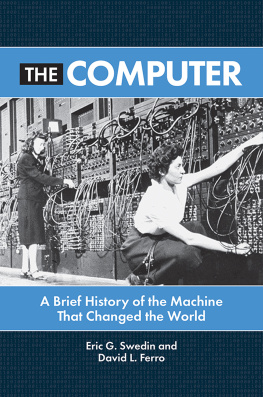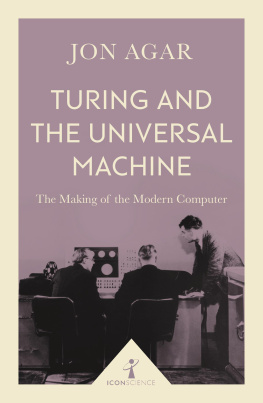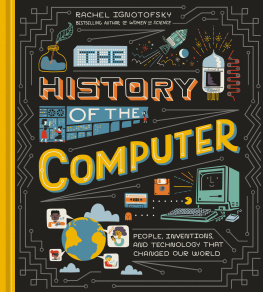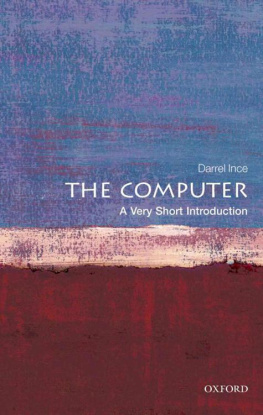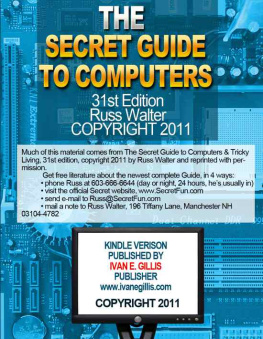The Computer
The Computer
A Brief History of the Machine
That Changed the World
Eric G. Swedin and David L. Ferro

Copyright 2022 by Eric G. Swedin and David L. Ferro
All rights reserved. No part of this publication may be reproduced, stored in a retrieval system, or transmitted, in any form or by any means, electronic, mechanical, photocopying, recording, or otherwise, except for the inclusion of brief quotations in a review, without prior permission in writing from the publisher.
Library of Congress Cataloging-in-Publication Data
Names: Swedin, Eric Gottfrid, author. | Ferro, David L., author.
Title: The computer : a brief history of the machine that changed the world / Eric G. Swedin and David L. Ferro.
Other titles: Computers
Description: Santa Barbara, California : Greenwood, an imprint of ABC-CLIO, LLC, [2022] | Revised edition of: Computers : the life story of a technology. | Includes bibliographical references and index.
Identifiers: LCCN 2022005417 (print) | LCCN 2022005418 (ebook) | ISBN 9781440866043 (hardcover) | ISBN 9781440866050 (ebook)
Subjects: LCSH: ComputersHistory. | BISAC: COMPUTERS / History | HISTORY / Modern / 20th Century / General
Classification: LCC QA76.17 .S94 2022 (print) | LCC QA76.17 (ebook) | DDC 004.09dc23/eng/20220427
LC record available at https://lccn.loc.gov/2022005417
LC ebook record available at https://lccn.loc.gov/2022005418
ISBN: 978-1-4408-6604-3 (print)
978-1-4408-6605-0 (ebook)
262524232212345
This book is also available as an eBook.
Greenwood
An Imprint of ABC-CLIO, LLC
ABC-CLIO, LLC
147 Castilian Drive
Santa Barbara, California 93117
www.abc-clio.com
This book is printed on acid-free paper 
Manufactured in the United States of America
Copyright Acknowledgments
The authors and publisher gratefully acknowledge permission for use of the following material:
IBM, the IBM logo, and ibm.com are trademarks or registered trademarks of International Business Machines Corporation, registered in many jurisdictions worldwide. Other product and service names might be trademarks of IBM or other companies. A current list of IBM trademarks is available on the Web at IBM Copyright and trademark information at www.ibm.com/legal/copytrade.shtml.
Contents
The computer may be the greatest technological and scientific innovation of modern times. The computer has changed how we work, how we organize and store information, how we communicate with each other, and even the way that we think about the universe and the human mind. Computers have alleviated the drudgery of calculating sums and clerical work, and they have become essential tools in all organizations. Computers have become ubiquitous in many aspects of everyday life, and the future trend is that computers will become ever more powerful, more commonplace, and easier to use. This book tells the story of this evolution.
The story of the computer began long ago. Many ancient civilizations sought ways to automate mathematics. The clay tablets of Babylon, the Roman and Chinese abaci, the mechanical adders of Pascal in the 1640s, and the steam-powered devices imagined by Charles Babbage in the nineteenth century all led toward the modern computer.
World War II provided the impetus for the development of the electronic digital computer. After the war, the Cold War security and defense needs of the United States drove the development of computing technology. These advances principally occurred in the United States: the giant brains of the SAGE (Semi-Automatic Ground Environment) early warning system included an interactive interface, the connecting of computers across the country in ARPANET (Advanced Research Projects Agency Network) led to the internet, and the miniaturization of circuitry for use in space and missile technology encouraged the development of integrated circuits.
Billions of computers around the world serve us in many ways, from helping us to write books to microwaving our food. Only a couple of decades ago, most people could not imagine the value of a computer in their homes, while today a majority of households in Western society contain numerous computers in many different forms. Computers changed the workplace by making clerical work more efficient and raised the expectations for greater individual productivity. The role of the secretary has been reduced, as individuals within the workplace are now expected to master word processing, spreadsheet, database, and numerous other programs on their personal workstations. The use of these programs has reduced the expected turnaround time for any task that these programs facilitate.
The computer created a nexus through which two major trends in human developmentadvances in communication and automatic calculationcame together. With the development of digital circuitry, we see the digitization of the senses: motion, sound, the written word, and even tastes and smells, given the right technology. With the advent of the different digital networks that make up the internet, we see the possibility of vast volumes of digitized content moving across the globe in milliseconds. With networked devices, storing and using this information has become decentralized. The ease of manipulating digital content, either purposely or accidentallyespecially text and picturesunfortunately lends itself to fraud. As human production is digitized, identification and authentication practices struggle to catch up.
The computer has become such a powerful device that we often adopt it as a powerful metaphor. Much as the clock in the Middle Ages changed the way that people interacted with reality through measured time and Newtonian physics and the invention of the steam engine in the eighteenth century stimulated scientists to think of the laws of nature in terms of machines, the success of the computer in the later twentieth century prompted scientists to think of the basic laws of the universe as being similar to the operation of a computer. The new physics of information has come to view matter and natural laws as bits of information. So too did the computer change our way of thinking about thinking. Through their efforts to create artificial intelligence, scientists reimagined the mind in terms of computer resources and discovered new insights into the biological mechanisms of thought and memory, though actual thinking machines are still more fantasy than reality.
We have striven to write an accessible historical overview of this ever-changing technology, giving students and the curious lay reader an understanding of the scope of its history from ancient times to the present day. We illuminate the details of the technology while also linking those developments to the historical context of the times. This book is about the story of computers, but it is also the story of the people and events that drove the many technological innovations that led to modern electronic computers. Both authors have each spent over four decades in the computer field and have watched history unfold. We began our careers when punched card readers were still used and are still actively engaged in our exciting field.
The notion of generations in computing technologies seen in early chapters actually came from an IBM marketing campaign but was adopted in the historical field. The term

